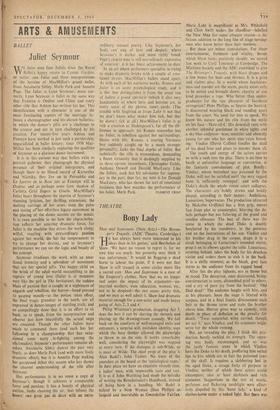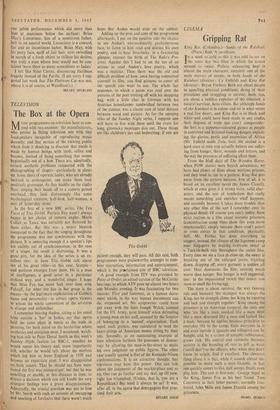THEATRE
Bony Lady
Man and Superman. (New Arts.)—The Reven- ger's Tragedy. (ADC Theatre, Cambridge.) EE has always been more interested in his ideas than in his genius,' said Beerbohm of Shaw. 'We have no reason to regret it, for we owe him too much; but posterity may think it was unfortunate.' It would be flogging. a dead horse to labour the point, if it were not that Shaw is still treated in some circles more like a sacred cow. Man and Superman is a case of the Emperor's clothes. Now that we no longer reel under the impact of its arguments—un- married mothers, state education, woman, etc., not to be despised—the rest seems pretty. thin, and we may as well admit it. Shaw had dramatic material enough for a one-acter and made heavy going of Acts 2, 3 and 4.
Philip Wiseman's production, dropping Act 3, does the best it can by slurring the rhetoric and playing up the drawing-room comedy. We fall back on the comforts of well-managed exits and entrances, a surprise will, mistaken identity, sops which the busy thinker allowed the playwright to throw in on the side. It works remarkably well, considering the playwright was stopped at every turn. If the dialogue is sub-Wilde, so is most of Wilde. The chief prop of the play is Alan Badel's John Tanner. No trace of the anarchist or the beard or the 'sociological rages.' In their place we have an exquisite smooth man, a ladies' man, with impeccable taste and tact. It is as if John Worthing had made the mistake of writing the Revolutionist's Handbook, instead of being born in a handbag. Mr. Badel is helped by a New Woman (Sian Philips) as languid and inscrutable as Gwendoline Fairfax. Marie Lohr is magnificent as Mrs. Whitefield and Clive Swift makes the chauffeur—labelled the New Man for some obscure reason—a de- licious addition to the long line of stage serving- men who know better than their masters.
_ But these are minor consolations. For sheer entertainment, freshness and vitality, beside which Shaw looks positively shoddy, we turned last week to Cyril Tourneur at Cambridge. The Marlowe Society and the ADC combined to give The Revenger's Tra:edy, with black drapes and a few boxes for beds and thrones. It is a grim and violent play. In a world where lascivious- ness and murder are the norm, purity exists only to be netted and brought down; chastity of any kind provokes a rape. Who better than under- graduates for the ripe pleasures of Jacobean corruption? Peter Phillips, as Spurio the bastard, is discovered wearing black and standing apart from the court. No need for him to speak. We know his nature and his role from the smile on his face—'Hate-all-I.' His downfall rests with another splendid gentleman in white tights and a sky-blue codpiece—lean, sensitive and absurdly young for one who has spent nine years brood- ing: Vindice (David Collins) fondles the skull of his dead love and plans to murder them all.
The youth and energy of the actors carries us with a rush into the play. There is no time to baulk at unfamiliar language or convention, at the fantastic convolutions of plot. Briefly: Vindice, whose betrothed was poisoned by the Duke, will not be satisfied until `the very ragged bone is sufficiently revenged'; and with the Duke's death the whole rotten court collapses. The characters are boldly drawn and boldly played, according to their names: Ambitioso, Lussurioso, Supervacuo. The production (directed by Malcolm Griffiths) has a firm grip, moves fast from plot to counterplot, blurring the de- tails perhaps but not faltering at the grand and sombre climaxes. The best of these was the scene in which the dead Duke is doubly butchered by his murderers, in the presence and on the instructions of his son. Vindice and his brother drag in the corpse, drape it in a cloak belonging to Lussurioso's intended victim, prop it on its elbows against the table. Lussurioso, strutting behind, takes the body for his drunken victim and orders them to stab it in the back. It is a chilly moment, as the blank, grey face stares at the audience from its ragged hood.
After this the play lightens, not in theme but in mood. The deception, once discovered, brings consternation to some, dissembled grief to others, and a cry of pure joy from the bastard: 'Old Dad dead!' The audience laughs with him, and at his pleasure. Soon the stage is littered with corpses, and in a final frantic d6nouement each heir to the throne turns and stabs the brother above him. Horror gives way to comedy, with death in place of deflation as the penalty for deceit. "Twas somewhat witty carried, though, we say it,' says Vindice, and his comment might serve for the whole evening.
But, on rereading the play, I think this pro- duction barely tackled its strength. The open- ing was badly mismanaged, and so was the justly famous scene in which Vindice lures the Duke to his death, proffering him veiled lips to kiss which are in fact the poisoned jaws of the skull. It requires a slobbering lust in the aged Duke, a savage fixity of purpose in Vindice, neither of which these actors could encompass; also at least darkness and rich costumes. Suggestions in the text of music, perfumes and flickering torchlight were effect- ively dispelled by this 'bony lady,' a kind of clothes-horse under a naked light. But there was
one subtle performance which did more than hint at seaminess below the surface: Brian May's Lussurioso. Son of a monstrous father, heir to an amoral world, Lussurioso is a coward, liar and an incontinent lecher. Brian May, with his pasty face, quiff of fair hair, eyes swivelling in search of a fresh object to titillate his desires, was truly a man whose heat would not be con- tained 'were there as many concubines as ladies.'
I felt like Stout Cortez, discovering Jacobean tragedy instead of the Pacific. (I am sorry 1 sug- gested last week that The Platinum Cat was not, where it is of course, at Wyndham's.)
HILARY SPURLING







































 Previous page
Previous page